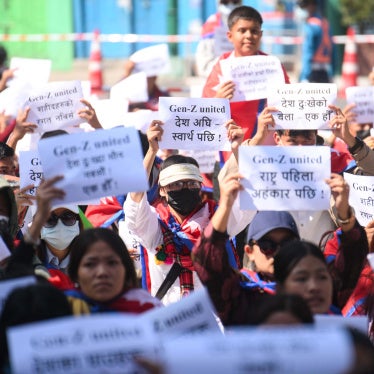Donor governments must insist that human rights are monitored in Iraq to ensure that their assistance is having a positive impact on the ground, Human Rights Watch said today as an international donors conference begins in Madrid.
In a memorandum to donor governments and agencies, Human Rights Watch stressed that reconstruction efforts would only succeed if they addressed longstanding human rights problems in Iraq and strengthened human rights protection for the future.
"The needs assessment presented to donors this week recognizes the importance of human rights, but it fails to address many critical issues and does not allocate the resources that will be required to solve them," said Rory Mungoven, global advocacy director for Human Rights Watch.
Human Rights Watch called on donors to support the creation in Iraq of a national human rights commission to review laws and investigate complaints, and an independent mechanism to prevent abuses by police and the courts. Donors should also help foster the capacity of local nongovernmental organizations to address human rights issues.
As the development of local human rights monitors would take time, the United Nations should expand its monitoring role in the interim. Human Rights Watch urged the United Nations to prepare for an expanded human rights operation in Iraq and deploy monitors as security conditions permit.
"Donors should not assist with training police and security forces in Iraq without monitoring their conduct in conformity with international policing and human rights standards," Mungoven said.
Human Rights Watch said significant resources would be needed to ensure accountability for past human rights abuses beyond the small provision made in the needs assessment. Help would be needed with investigations and witness protection, and for support to victims and their relatives.
"Donors will only be successful in reconstructing the rule of law in Iraq if they also address the serious abuses of the past," said Mungoven. "But justice cannot be done on the cheap, nor should donors support a flawed justice process."
Human Rights Watch warned that an Iraqi-led accountability process as supported by the United States would likely fail to ensure justice, because the Iraqi judiciary lacks the capacity and expertise for trials of this kind. Instead, donors should commission a group of international and Iraqi experts to make a proper assessment and recommend the best justice model.
The United Nations and World Bank have also identified property restitution for refugees and internally displaced persons as a critical issue. Human Rights Watch urged donors to help provide shelter to families in immediate need and to establish a special mechanism to settle longer-term property disputes. Other countries should not require refugees to return to Iraq, however, until security conditions permit.
Human Rights Watch said the needs assessment presented to donors paid insufficient attention to the specific needs of children in post-war Iraq. Special efforts are needed to reach vulnerable groups such as street children and to combat trafficking and hazardous child labor. Human Rights Watch also urged donors to help build the capacity of Iraq's law enforcement and judicial sector to address sexual violence against women and girls.
The full text of Human Rights Watch's memo to donor governments and agencies can be found at: https://www.hrw.org/backgrounder/mena/iraq/iraq-memo102203.htm






